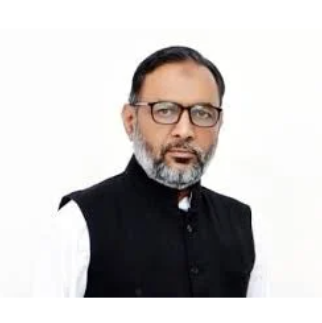– Mohd Naushad Khan
As the Supreme Court reserves its verdict in the Waqf case, Syed Qasim Rasool Ilyas, spokesperson of All India Muslim Personal Law Board (AIMPLB), has come forward with a sharp and detailed critique of the Waqf (Amendment) Act 2025 and the politico-legal atmosphere surrounding it. In an exclusive interview with Mohd Naushad Khan, Dr. Ilyas offered critical insights into what he termed a “systematic attack” on the constitutional and religious rights of minorities in India.
This legal battle, he contends, is not just about the Waqf properties but about the very principles enshrined in the Constitution of India – principles of equality, religious freedom, and the protection of minority institutions.
Speaking about the AIMPLB national campaign against the Waqf Bill (now Act), Ilyas highlighted its three primary objectives. First, it aimed to educate the Muslim community about the bill’s real implications, countering the government’s claim that it was intended for the welfare of Muslims.
“Contrary to what the government claims,” said Ilyas, “the bill has been brought to dismantle Waqf properties rather than to empower the community. There is nothing in this law that benefits Waqf institutions.”
Secondly, the campaign sought to address misconceptions among non-Muslims, particularly the notion that Waqf Boards arbitrarily seize private or public property. By organising roundtables across major cities, the Board engaged with intellectuals, Dalits, Adivasis, OBCs, and members of other religious minorities to explain how the bill is unconstitutional and discriminatory.
Lastly, the campaign had a strong political dimension. Through interactions with the Joint Parliamentary Committee (JPC), the Board and allied organisations ensured that the Muslim voice was not only heard but registered in record numbers – nearly five crore emails were sent to the JPC, marking an unprecedented civic mobilisation in the history of Indian legislative processes.
Ilyas pointed to the Waqf Bill’s passage through Parliament as indicative of a deeply divided political landscape. “The entire Opposition stood with us,” he said, emphasising that only the BJP and its allies supported the bill.
Although the government succeeded in pushing the legislation through, Ilyas believes that the robust debate in Parliament – and the unity of the Opposition – sent a powerful political message.
“Demonstrations were organised in Patna and Vijayawada to target NDA allies like JD(U) and TDP. The massive rally at Gandhi Maidan on June 29 made it clear that Muslims are unlikely to support JD(U) in the upcoming elections,” he said.
When asked whether he continues to trust the judiciary after the Supreme Court’s controversial verdict in the Babri Masjid case, Ilyas responded cautiously but optimistically.
“There have indeed been judgments that raise questions about judicial impartiality,” he admitted. “But this case is different. It is not Hindu vs. Muslim – it is Muslims vs. the Government. And it is based squarely on constitutional violations.”
Ilyas emphasised that the challenge rests on violations of Articles 14, 15, 25, 26, 29, 30, and 300 of the Constitution. He expressed hope that the judiciary would uphold the Constitution over legislative overreach, as it has stated in several previous judgments.
“If the verdict goes against us, it will cast a shadow on the credibility and neutrality of the judiciary. But we believe the court will not take that risk,” he asserted.
If the final judgment, whether from the current bench or a future larger one, does not favour the Muslim community, Ilyas is clear: there will be a mass political movement.
“The fight will not be left to Muslims alone. If the government can lay its hands on Waqf properties, it can target Gurdwaras, Churches, and Hindu temples next. This is a collective issue of religious freedom,” he warned.
The movement, according to Ilyas, will span across communities and be similar in scale and spirit to the farmers’ protest against the now-repealed agricultural laws.
An important point of contention in the Supreme Court hearings has been the definition of essential religious practices. Ilyas criticised the judiciary’s attempt to define what constitutes essential practices in any religion.
“This is a theological question, not a legal one,” he said. “Only religious scholars can determine what is essential in a faith. The court cannot become a Mufti.”
He defended Waqf as a deeply embedded and essential Islamic institution, supported not only by Qur’anic injunctions but also by centuries of historical practice.
“Waqf is not something new. It is a 1,500-year-old institution. Even Prophet Muhammad ﷺ and the four Caliphs instituted Waqf. It’s fundamental to Islamic civilization.”
As of now, the Supreme Court has reserved its verdict on interim relief. Ilyas anticipates that some form of relief will be granted. Previous instances of relief had addressed issues like the work-by-user clause, nomination of the Central Waqf Council, and government property claims.
This time, he said, additional areas such as protected monuments, Archaeological Survey of India’s authority, tribal land restrictions, and the Law of Limitation may also be brought under the court’s scrutiny.
“This judgment is only for interim relief. The larger constitutional questions will be taken up by a larger bench later,” he clarified.
In his closing remarks, Ilyas underlined the importance of democratic participation and public awareness.
“You cannot suppress the voice of 20 crore Muslims. We have faith in the Constitution, and if needed, we will take this fight to the streets and to the ballot.”
He compared the situation to the historic farmer protests, stating, “If 700 farmers could give their lives to repeal unjust laws, we too are ready to stand until justice is served.”
As India awaits the Supreme Court’s judgment in the Waqf case, the words of Dr. SQR Ilyas serve as a reminder that constitutional rights, once infringed, can only be reclaimed through unity, awareness, and unrelenting civic action.
The case, he believes, is more than a legal issue it is a defining moment for the future of pluralism, minority rights, and democratic justice in India.




